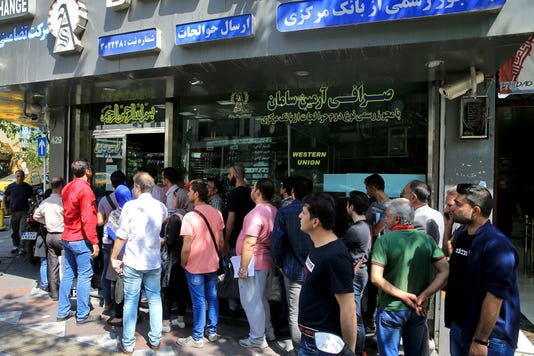US terminates pact with Iran after UN court ruling on sanctions
The United States and Iran have been lobbing threats, fighting proxy wars, and imposing sanctions for decades. USA Today looks at over 60 years of this back-and-forth. Just the FAQs, USA TODAY.

WASHINGTON – Secretary of State Mike Pompeo announced Wednesday that the United States is canceling a relatively obscure but decades-old economic treaty with Iran after a sanctions-related ruling by the United Nations’ highest court.
Before the second phase of Washington’s reimposition of sanctions on Iran next month over its nuclear program, the U.N. International Court of Justice (ICJ), based in the Hague, Netherlands, ordered President Donald Trump’s administration to lift any punitive measures that affect Tehran’s imports of humanitarian goods and products and services linked to civil aviation safety. The ruling was provisional.
Iran challenged the U.S. sanctions in a case filed in July on the grounds that they violate the 1955 Treaty of Amity, an agreement covering economic relations and some reciprocal consular rights.
“This is a decision that is, frankly, 39 years overdue,” Pompeo said in a news briefing in Washington. He said Iran tried to interfere with the “sovereign rights of the United States” by going to the ICJ. “Iran is abusing the ICJ for political and propaganda causes,” he said. He said Iran’s claims to the court are “absurd.”
Washington has long insisted that its sanctions do not target humanitarian goods or services, but the sanctions it imposed on Iran after Trump pulled out of a nuclear deal with Tehran and world powers in May restrict Iran’s ability to use the international banking system – that, in turn, has affected its imports of essential medicines and consumer goods. It has also pressured international companies operating in the Middle Eastern country. Many have wound down their operations in recent months.
In its judgment, the court said Washington must “remove, by means of its choosing, any impediments arising from” the reimposition of sanctions that affect exports to Iran of medicine and medical devices; food and agricultural commodities; and spare parts and equipment necessary to ensure the safety of civil aviation.
Iran has an aging civilian aircraft fleet for which it’s unable to acquire spare parts, and it has seen numerous airplane crashes in recent years.
Richard Goldberg, a senior adviser at the Foundation for Defense of Democracies, a Washington-based research institute, said the “U.S. sanctions already have a humanitarian exemption for food, medicine and agriculture commodities – an exemption the mullahs (Iran’s religious leaders) often use to make money on the black market while denying the Iranian people access to humanitarian goods.”
Goldberg was a senior Senate aide who helped develop the Iran sanctions returning. He strongly favored pulling out of the nuclear deal.
“As for civil aviation, perhaps the court should be better educated on how Iran misuses its civil air fleet to ship arms to terrorist organizations,” he said.
Pompeo said the United States “will continue to make sure we are providing humanitarian assistance” to the Iranian people.
“Outlaw regime,” Iranian Foreign Minister Javad Zarif wrote on Twitter, reacting to the U.S. decision to leave the treaty.
The next installment of U.S.-sponsored sanctions on Iran is due Nov. 4. It will target Iran’s lucrative oil industry. Sanctions reinstated in August clamped down on Iran’s access to U.S. dollars, its car industry and trading in some commodities.
Neither Wednesday’s ruling nor the termination of the treaty is likely to have significant impact on the Trump administration’s implementation of the sanctions. The International Court of Justice’s rulings are legally binding, but the court has no power to enforce them.
Still, Farshad Kashani, an international law expert, wrote in an analysis in 2016 of the now-terminated treaty that it has been “vital to defusing flashpoints between the two otherwise hostile nations. … It is a great benefit that there is an agreed mechanism in place to help resolve disputes when diplomacy proves futile.”
Jamal Abdi, president of the National Iranian American Council, called the U.S. decision rash and ill-considered.
“Rather than take the humanitarian concerns of the international community with U.S. sanctions on Iran seriously, the U.S. impetuously withdrew from a treaty aimed at solidifying friendly relations between the American and Iranian peoples,” Abdi said.
Pompeo escalated his criticism of Iran’s role in Iraq.
He said Iran was to blame for a mortar attack near the U.S. Embassy in Baghdad and a rocket attack on the U.S. Consulate in Basra. The State Department announced last week it would close the Basra facility.
“Iran is the origin of the current threat to Americans in Iraq,” Pompeo said Wednesday. “Our intelligence in this regard is solid.”
Pompeo said the United States would hold Iran “directly responsible for any harm to Americans or our diplomatic facilities, whether perpetrated by Iranian forces or by associated proxies.”
Iraqi officials urged the United States on Wednesday to reconsider its decision to close the Basra consulate, and they cast doubt on Pompeo’s assertions of Iran’s influence in that region.
Pompeo argued that the attacks in Iraq were linked to the Trump administration’s reimposition of sanctions and America’s efforts to isolate Iran after the U.S. withdrawal from the multilateral 2015 nuclear agreement.
“Clearly, they see our comprehensive pressure campaign as serious and succeeding,” he said.
More: Trump’s hard line against Iran may leave U.S. more isolated, experts say
More: Iran’s Persian carpet industry fears having the rug pulled from under it by U.S. sanctions
More: USA TODAY journalist gets rare access to report from inside Iran